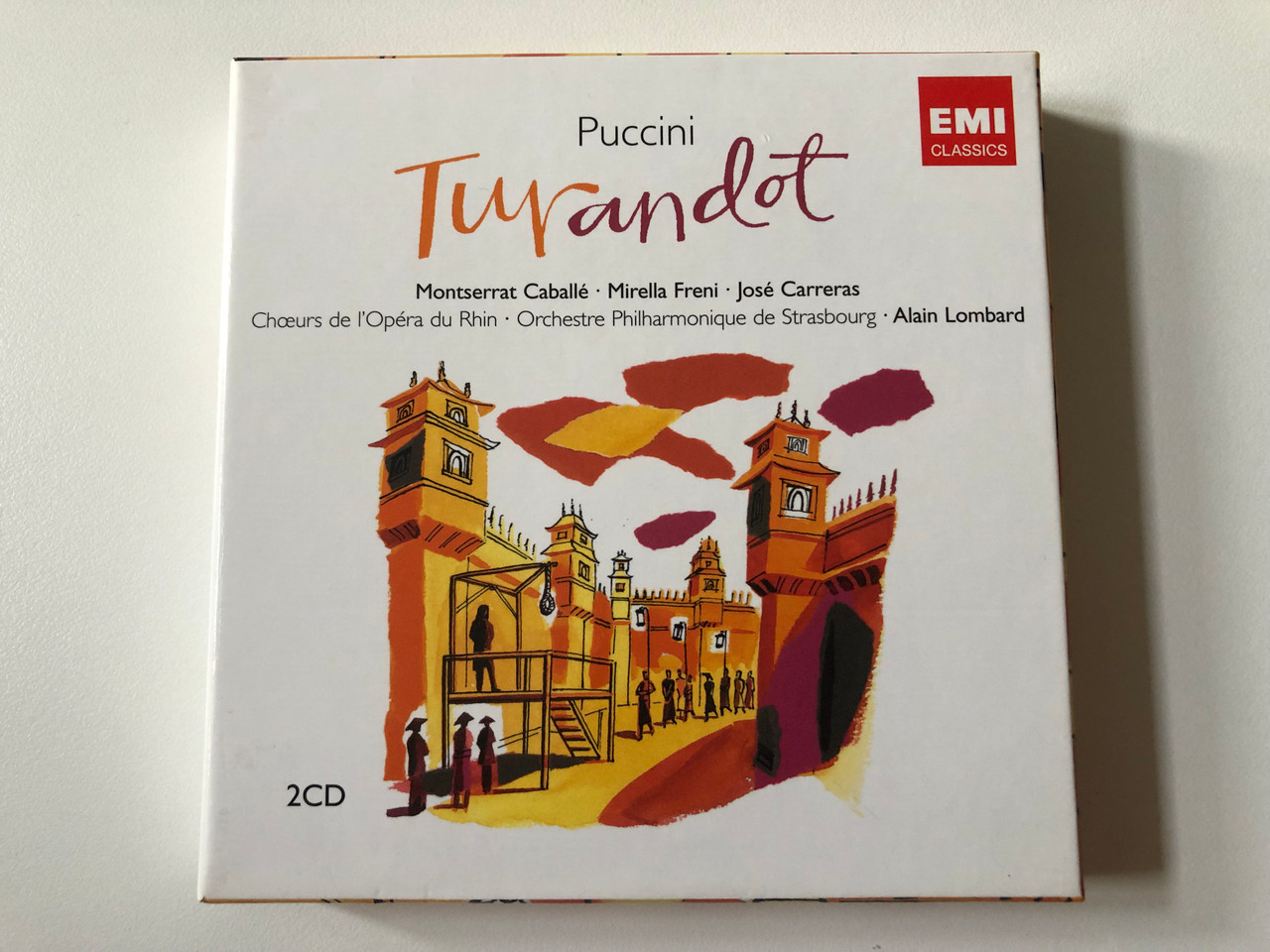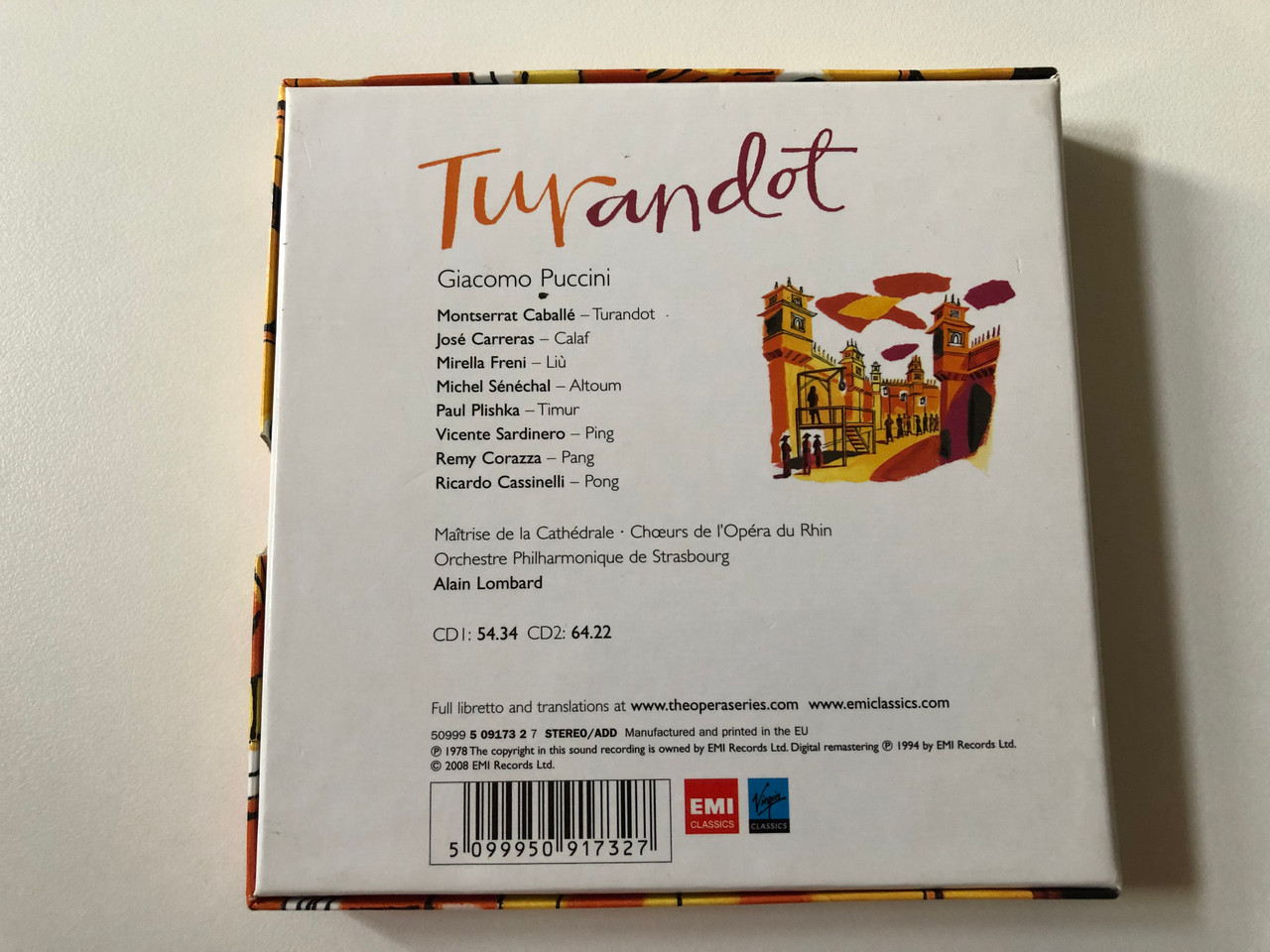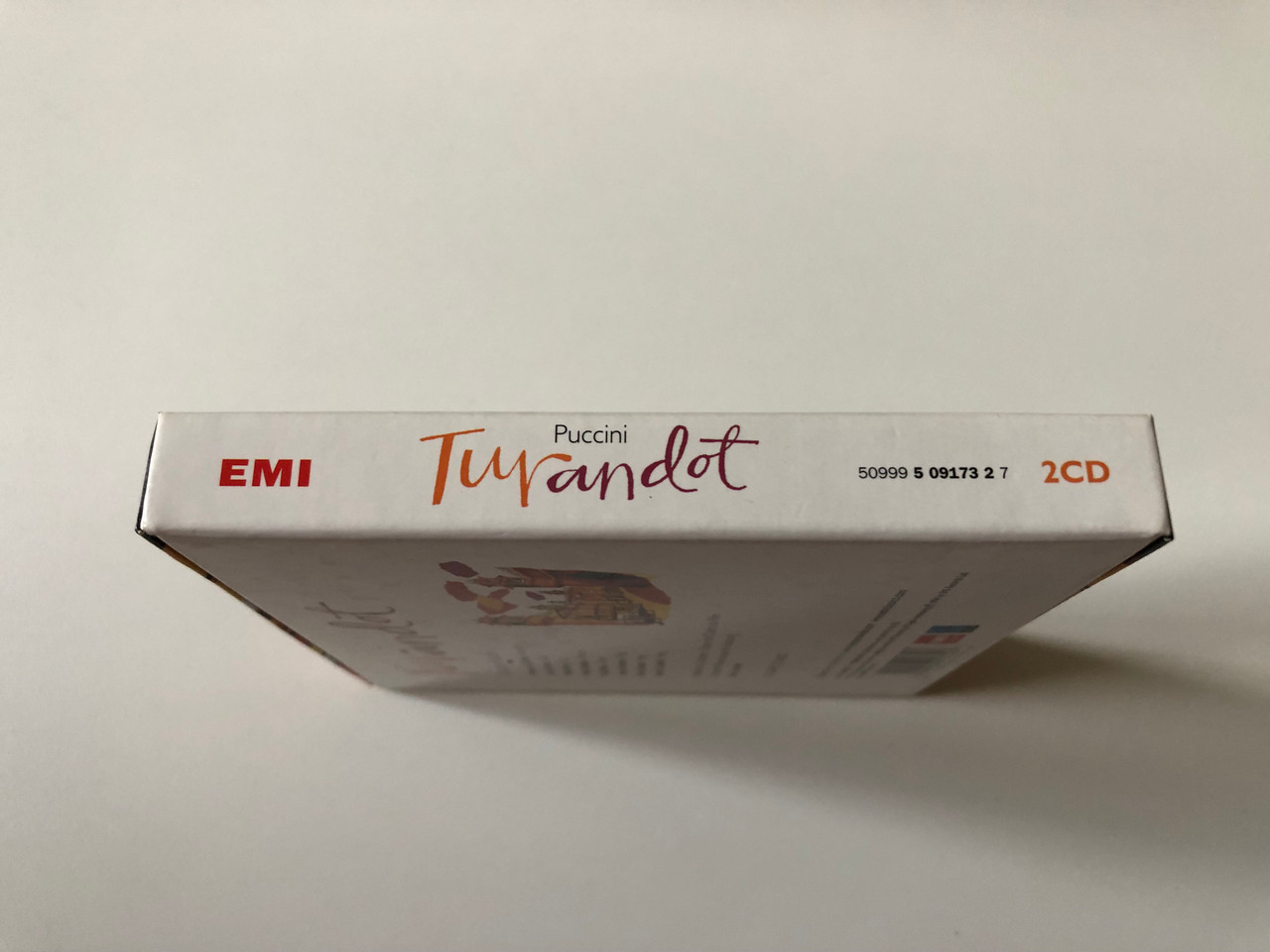Description
Puccini - Turandot - Montserrat Caballé, Mirella Freni, José Carreras, Chœurs de L'Opéra Du Rhin, Orchestre Philharmonique De Strasbourg, Alain Lombard / EMI Classics 2x Audio CD 2008, Box Set
UPC 5099950917327
!!! Condition of CD is USED - LIKE NEW !!!
Turandot (Italian: [turanˈdɔt]) is an opera in three acts by Giacomo Puccini, posthumously completed by Franco Alfano in 1926, and set to a libretto in Italian by Giuseppe Adami and Renato Simoni. Turandot's best-known aria is "Nessun dorma", which became globally popular in the 1990s following Luciano Pavarotti's performance of it for the 1990 FIFA World Cup.
Though Puccini first became interested in the subject matter when reading Friedrich Schiller's 1801 adaptation, he based his work more closely on the earlier play Turandot (1762) by Count Carlo Gozzi. The original story is one of the seven stories in the epic Haft Peykar—a work by twelfth-century Persian poet Nizami (c. 1141–1209). Nizami aligned his seven stories with the seven days of the week, the seven colors, and the seven planets known in his era. This particular narrative is the story of Tuesday, as told to the king of Iran, Bahram V (r. 420–438), by his companion of the red dome, associated with Mars. In the first line of the story, the protagonist is identified as a Russian princess. The name of the opera is based on Turan-Dokht (daughter of Turan), which is a name frequently used in Persian poetry for Central Asian princesses.
The opera's version of the story is set in China. It involves Prince Calaf, who falls in love with the cold Princess Turandot. In order to obtain permission to marry her, a suitor must solve three riddles. Any single wrong answer will result in the suitor's execution. Calaf passes the test, but Turandot refuses to marry him. He offers her a way out: if she is able to guess his name before dawn the next day, he will accept death. In the original story by Nizami, the princess sets four conditions: firstly "a good name and good deeds", and then the three challenges. As with Madama Butterfly, Puccini strove for a semblance of authenticity (at least to Western ears) by integrating music from the region. Up to eight of the musical themes in Turandot appear to be based on traditional Chinese music and anthems, and the melody of a Chinese song "Mò Li Hūa (茉莉花)", or "Jasmine", became a motif for the princess.
Puccini left the opera unfinished at the time of his death in 1924; Franco Alfano completed it in 1926. The first performance took place at the Teatro alla Scala in Milan on 25 April 1926, conducted by Arturo Toscanini. The performance included only Puccini's music without Alfano's additions. The first performance of the opera as completed by Alfano was performed on the next evening, 26 April, although it is disputed whether the second performance was conducted by Toscanini or by Ettore Panizza.
| Label: | EMI Classics – 5099950917327 |
|---|---|
| Series: | The Opera Series |
| Format: |
2 x CD, Album, Box Set
|
| Country: | Europe |
| Released: |
2008 |
| Genre: | Classical, Stage & Screen |
| Style: | Opera, Romantic |
Tracklist:
| Turandot, Opera | |||
| Atto Primo | |||
| 1-1 | Popolo Di Pekino! | 2:29 | |
| 1-2 | Padre! Mio Padre! | 1:34 | |
| 1-3 | Perduta La Battaglia | 1:15 | |
| 1-4 | Gira La Cote! Gira! | 2:15 | |
| 1-5 | Perché Tarda La Luna? | 3:46 | |
| 1-6 | Là, Sui Monti Dell'est | 0:56 | |
| 1-7 | O Giovinetto! Grazia! Grazia! | 5:28 | |
| 1-8 | Figlio, Che Fai? | 1:43 | |
| 1-9 | Fermo! Che Fai? T'arresta! | 1:47 | |
| 1-10 | Silenzio, Olà! | 1:05 | |
| 1-11 | Guardalo, Pong! | 0:58 | |
| 1-12 | Non Indugiare! | 2:01 | |
| 1-13 | Signore, Ascolta! | 2:49 | |
| 1-14 | Non Piangere, Liù! | 2:31 | |
| 1-15 | Ah! Per L'ultima Volta! | 2:46 | |
|
Atto Secondo |
|||
| 1-16 | Olà, Pang! Olà, Pong! | 1:10 | |
| 1-17 | O China, O China | 1:51 | |
| 1-18 | Ho Una Casa Nell'Honan | 2:54 | |
| 1-19 | O Mondo, Pieno Di Pazzi Innamorati! | 1:38 | |
| 1-20 | Addio, Amore! | 3:42 | |
| 1-21 | Noi Si Sogna | 1:04 | |
| 1-22 | Gravi, Enormi En Imponenti | 3:29 | |
| 1-23 | Un Giuramento Atroce Mi Costringe | 2:34 | |
| 1-24 | Diecimila Anni Al Nostro Imperatore! | 2:32 | |
| 2-1 | In Questa Reggia | 7:11 | |
| 2-2 | Straniero, Ascolta! | 2:46 | |
| 2-3 | Guizza Al Pari Di Fiamma | 2:32 | |
| 2-4 | Gelo Che Ti Dà Foco | 2:41 | |
| 2-5 | Gloria, O Vincitore! | 1:03 | |
| 2-6 | Figlio Del Cielo! | 3:10 | |
| 2-7 | Tre Enigmi M'hai Proposto | 1:50 | |
| 2-8 | Ai Tuoi Piedi Ci Prostriam | 2:03 | |
|
Atto Terzo |
|||
| 2-9 | Così Comanda Turandot | 3:30 | |
| 2-10 | Nessun Dorma! | 3:01 | |
| 2-11 | Tu Che Guardi Le Stelle | 3:56 | |
| 2-12 | Principessa Divina! | 2:46 | |
| 2-13 | Quel Nome! | 1:21 | |
| 2-14 | L'amore?...Tanto Amore, Segreto E Inconfessato |
3:22 | |
| 2-15 | Tu, Che Di Gel Sei Cinta | 5:04 | |
| 2-16 | Liù...Bontà! | 2:34 | |
| 2-17 | Principessa Di Morte! | 3:21 | |
| 2-18 | Che È Mai Di Me? | 2:58 | |
| 2-19 | Del Primo Pianto...Ah... | 4:08 | |
| 2-20 | La Mi Gloria È Il Tuo Amplesso! | 1:13 | |
| 2-21 | Diecimila Anni Al Nostro Imperatore! | 3:38 |
- Baritone Vocals [Ping] – Vicente Sardinero
- Baritone Vocals [Un Mandarino] – Eduard Tumageanian
- Bass Vocals [Timur] – Paul Plishka
- Chorus – Chœurs de L'Opéra Du Rhin, Maîtrise De La Cathédrale
- Chorus Master – Günter Wagner
- Composed By – Giacomo Puccini
- Conductor – Alain Lombard
- Orchestra – Orchestre Philharmonique De Strasbourg
- Producer – David Mottley
- Soprano Vocals [La Principessa Turandot] – Montserrat Caballé
- Soprano Vocals [Liù] – Mirella Freni
- Soprano Vocals [Prima Voce] – Petranka Malakova
- Soprano Vocals [Seconda Voce] – Eva Saurova
- Sound Designer – Michael Gray (5)
- Tenor Vocals [Calaf (Il Principe Ignoto)] – José Carreras
- Tenor Vocals [Il Principino Di Persia] – Alberto Cupido
- Tenor Vocals [L'Imperatore Altoum] – Michel Sénéchal
- Tenor Vocals [Pang] – Rémy Corazza
- Tenor Vocals [Pong] – Ricardo Cassinelli












































